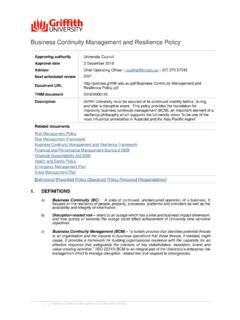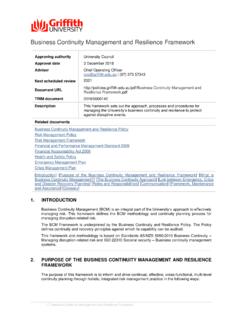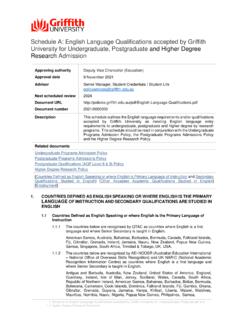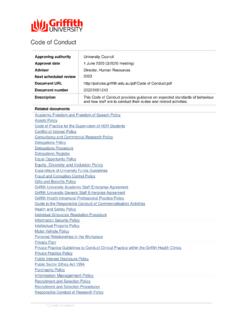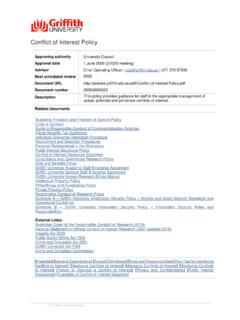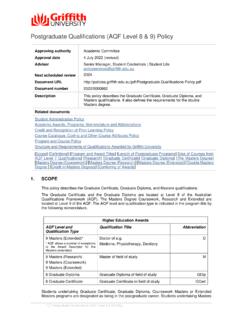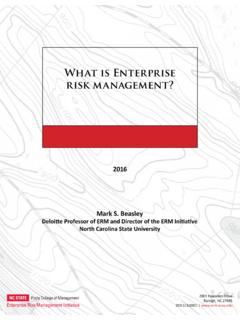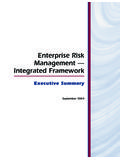Transcription of Enterprise Risk Management Framework
1 1 Enterprise Risk Management Framework 2020 Enterprise Risk Management Framework Approving authority Finance, Resources and Risk Committee Approval date 23 November 2020 (6/2020 meeting) Advisor Peter Bryant | Chief Operating Officer I | (07) 373 57343 Next scheduled review 2021 Document URL Document Number 2020/0000061 Description This Framework outlines the components of the University s risk methodology and processes to support a consistent approach to managing risk across the University.
2 It sets out the procedures and guidelines for implementing, monitoring, reviewing and continually improving risk Management throughout the University. The University s Enterprise risk Management is aligned to the principles set out in the universally accepted standards; ISO 31000: 2018 Enterprise Risk Management and 2017 COSO ERM Integrating with Strategy and Performance Related documents Enterprise Risk Management Policy Risk Appetite Statement Business Continuity Management and Resilience Policy Business Continuity Management and Resilience Framework Crisis and Recovery Management Plan Compliance Management Framework Code of Conduct Fraud and Corruption Control Framework Fraud Investigation Procedure Financial and Performance Management Standard 2009
3 Financial Accountability Act 2009 Health and Safety Policy The Responsible Conduct of Research Risk Management Standards (AS/NZ 31000:2018 Risk Management Guidelines and 2017 COSO Enterprise Risk Management - Integrating with Strategy and Performance) [1. Introduction] [2. Risk Management Principles] [3. Governance ] [4. Risk Categories] [5. Three Lines of Defence Model] [6. The Risk Management Process] [7. Roles and Responsibilities] [8. Enterprise Risk Management Framework Review] [Annexures and Appendices] INTRODUCTION Risk is the effect of an event and its likelihood of occurring.
4 It is the chance of something happening that will have an impact on the achievement of our objectives. This impact may be positive or negative, meaning that risks may present an opportunity or a threat. Therefore, risk Management can be value protecting or value enhancing. Minimising the effect of negative risk or threats, protects value. Taking considered risks to enhance growth, transformation and innovation enhances value. Where risks are proactively identified and effectively managed there is potential for making the most of new opportunities.
5 2 Enterprise Risk Management Framework 2020 Effective risk Management supports the University to achieve our strategic and operational objectives. It is an essential part of good governance and helps to: Drive a culture where everyone takes responsibility for risk Empower our people to make informed decisions Enhance performance and organisational resilience The Enterprise Risk Management Policy (the Policy) is the core document which affirms our commitment to building a robust and ethical risk Management culture.
6 The Policy is approved and mandated by the University Council. This Enterprise Risk Management Framework (ERMF) sets out the procedures and guidelines for implementing the principles outlined in the Policy. There are several related documents that exist across the University. These related documents operate alongside and support the concepts included in the Policy and the ERMF. One of the related documents, the Crisis and Recovery Management Plan, provides guidance to the University on the appropriate Management of a crisis event that has materialised and which has the potential to severely damage the University s operational and strategic objectives.
7 The steps and processes described in the Crisis and Recovery Management Plan are designed to reduce the negative consequences that might otherwise flow from an escalating crisis event. RISK Management PRINCIPLES Our risk Management approach and processes are based on the following principles. Risk Management Governance and Culture The University s risk Management governance and culture are founded on our vision, mission, values, objectives, strategies and policies. Our risk Management governance Framework aims to: Set the tone for our approach to risk Reinforce the importance of managing risk proactively Empower our people to take responsibility for risk Foster a balanced risk culture The goal of risk Management is to support the achievement of our desired outcomes.
8 Our risk governance and culture are based on: The risk Management tone set by the University Council and its governing committees A values-based approach to risk that embeds risk Management and decision making into everything we do Our people committing to our core values and principles by proactively managing risk Attracting, developing and retaining people who are committed to delivering higher risk-adjusted performance in accordance with our risk appetite Strategy and Objective-setting The University integrates Enterprise risk Management , strategy, and objective-setting in the strategic planning process.
9 We establish and align our risk appetite with strategy and organisational objectives, turning strategy into practice while serving as a basis for identifying, assessing, and responding to risk. Performance We have defined performance measures that help us achieve our strategic objectives. Our operational plans are created and implemented based on these measures. risks are uncertain events be they opportunities 3 Enterprise Risk Management Framework 2020 or threats that impact on our performance.
10 The process of forecasting the potential for risks , assessing their impact, and putting in place measures to manage that impact is essential to our operations. Review and Revision We are committed to improving processes in all that we do. We will periodically review risk Management processes to identify opportunities for improvement and increased risk Management maturity. Information, Communication and Reporting Good communication is essential to effective risk Management . It involves constant sharing of information sourced from both inside and outside the University.
